Wooooohoooo! I can’t tell you how excited I am to be taking part in RC Bridgestock’s WHEN A KILLER STRIKES blog tour today! My thanks to the authors and Caffeine Nights for asking me to take part.
About The Authors
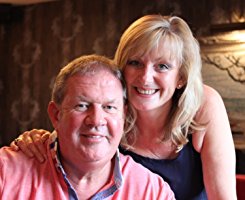
The D.I. Dylan series of books by RC Bridgestock (Husband and wife writing team, Bob and Carol Bridgestock) comes from a unique perspective of a collective real life experience of high level policing of 47 years. As a career detective Bob Bridgestock worked in the CID at every rank. For over half of his service he was a senior detective, retiring at the rank of Detective Superintendent of the West Yorkshire Police force.
As a Senior Investigative Officer (SIO) in charge of homicide cases he took command of some twenty-six murder investigations, twenty-three major incidents including shootings and attempted murders and over fifty suspicious deaths and numerous sexual assaults, some of which were extremely high profile in his last three years alone.
Bob brings this unique insight and experience from how real life cases are conducted into page turning gripping fiction, aided by his wife Carol, who has 17 years working within the force. Carol brings her understanding and the experience of a partner of a frontline detective to the D.I. Dylan series. This combination adds authenticity rarely seen in British crime fiction, coupled with warmth, humour and humanity.
The books offer an insight into the real world of British policing mixed with cunning plots and human relationships. This adds a dimension to police procedural fiction which is truly genuine in voice and substance.
Caffeine Nights Publishing is proud to be associated with this series of books which grip and touch the human heart as well as engage the mind.
About The Book
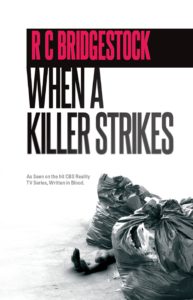
“Boss, we’ve got a body”.
Hardly what Detective Inspector Jack Dylan needs to hear on his day off, especially as he’s in the middle of house-hunting with his wife Jen.
Detective Sergeant Vicky Hardacre greets him at the scene, but what awaits them behind the blood red door of Colonial House is undoubtedly a murder. The approach identifies several prime suspects. But who is telling the truth; and who is lying?
Before the killer can be caught, another body is discovered, this time in a putrefying mixture of mud and slime, lain amongst the remnants of decaying food within a waste-bin shelter. Now it’s the task of the man in charge to make the call.
Are the two murders connected?
There’s only one way to find out, and that’s by working long hours, within strict budgets, and the usual pressure from above to obtain quick results.
However, Dylan is distracted by personal matters, with Jen being keen to seal the deal on a renovation project. He suggests they delay finalising the purchase; until he discovers the significance of the house, and that it’s about to be demolished.
In his absence, Jen’s pleas for help from his estranged siblings are answered, resulting in hidden secrets coming to light, as Dylan continues, through a twisting and turning plot, to ensure justice is done in respect of the murder victims, whose bright hopes for the future were cruelly snatched away.

A producer told Bob recently, ‘You do realise you suffer from post traumatic stress disorder, don’t you?’ It appeared to come as a shock to him, but not to me. There was no such thing as counselling for police officers in the day. In fact actually not that long ago. And, as long as someone picked up the next suspicious death; took charge of the murder enquiry, major incident, serious crime no one seemed to care.’ Why then are we readers/viewers surprised that most of our fictional detectives need a crutch? They’re either drinkers, smokers, or womanisers.
Is writing cathartic for an ex cop? I think so… See what you think.
Bob dealt with hundreds of dead bodies in his 30 year detective led police career; he has been cuffed, sat next to, and interviewed cold blooded murderers who showed no remorse – one thing that appears to be a common factor is that they all appear ‘dead behind the eyes’. Indeed a brain scan of rapist and serial killer Brian Dugan showed a lack of activity in the regions associated with empathy and remorse – and then Bob retired, and became co-author of the Detective Inspector Jack ‘Dylan’ series with his wife Carol.
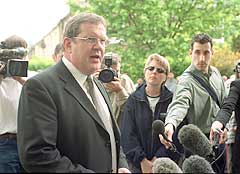
Bob had reached the rank of Detective Superintendent, Senior Investigative Officer, in charge of major incidents for West Yorkshire Police, the fourth largest force in the country. But, at just 51, he knew it was time to go. ‘I’d often see more horrific scenes in a weeks than most people would see in a lifetime,’ he says. So, with his wife Carol, who also worked in the same Force as a support officer, they ‘retired’ to the Isle of Wight, where the plot of their lives took an unlikely turn. They became unintentionally international authors.
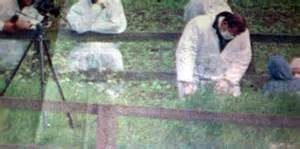
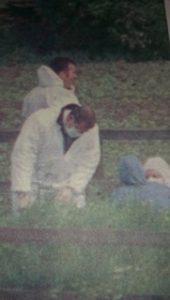
Actually writing their own book seemed as unlikely a turn of events as many in TV drama. ‘I’ve a lifetime of cases to draw inspiration from, but we didn’t consider ourselves writers. The starting point of our partnership in writing, believe it or not was an off the cuff remark from someone who had asked us to do a talk for charity – ‘You two should write a book!’
A second career perhaps was meant to be as the following day there was an advert for a writing course at the local college, and to Carol’s surprise Bob enrolled himself and her on it. The result was Deadly Focus, a novel which was well received by the public, police and the reviewer from the largest national newspaper at the time – Natasha Harding who credited it as, ‘A cracking story!’ And, a favourite in her weekly column that also continued to say:- ‘The husband-and-wife co-authors, who spent years working within the police force, make this fictional tale believable in every way.’
The couple have gone on to write seven more books, the second, Consequences, third White Lilies, fourth Snow Kills, fifth Reprobates, sixth Killer Smile, the seventh When The Killing Starts and the eighth When A Killer Strikes publication date 19th October 2017.
Carol describes how two people can work on one book. ‘Bob writes the skeleton of a story, with his detective ‘mask’ firmly in place. Basically, he (Dylan) is called to the scene of a dead body as the man in charge. The investigation/enquiry takes it’s natural course and results, usually in the apprehension of the perpetrators. I then write the second draft – put the flesh on the bones, build he characters and give the victim a life… I also write, and weave in the sub plot which is the family life storyline. What appears to be unusual in crime fiction is that Dylan is a family man with a home life too. He’s no drinker, smoker, womaniser -he’s just a normal guy… Well, as normal as you can be giving the sights he sees, and man’s inhumanity to fellow man. Third draft is talking to Bob and taking off the mask of the detective to find out how a human being copes with this on a daily basis. How does he actually feel when he attends a horrific scene? What about a post-mortem? When, where and how does he tell the victims loved ones that they have been taken from them in the most brutal way imaginable. Only he can tell me these things because he has been there, bought the T-shirt as they say, on more occasions than he cares to remember.
It’s hard to square the circle between Bob’s very talkative avuncular comedian personality and the dogged and hard-faced policeman you see in the newspaper cuttings. For even in the fuzziest little newspaper picture, Bob appears as a human mask, exhausted eyes peering out of fixed pallid face. ‘There were times I was dealing with six murder enquiries at once,’ he says.
Bob’s early brushes with the law should have turned him off the idea of policing. ‘When I was six years old my elder brother picked a fog warning detonator off the railway line and told me he’d got me a watch,’ grins Bob. ‘I was given a clip round the ear by the policeman. That didn’t seem fair!’
Bob, born in 1952, was one of five siblings in the small Yorkshire village of Marsden, on the border with Lancashire. Although his father was working there wasn’t much money to feed a large family. ‘We used to hide under the stairs from either the lightening or the rent man,’ he grins. It was a life of hand-me-downs and making do. ‘My dad used to repair all the shoes: for two years I thought I had a club foot, because one foot was higher than the other!’
He had two paper rounds before walking a mile and a half to school. ‘But,’ he says, ‘you just got on with it. Everyone did.’ He made it to grammar school, but Bob didn’t take his GCEs. ‘I was offered a job at the butchers where I’d worked on a Saturday – and decided to take it.’
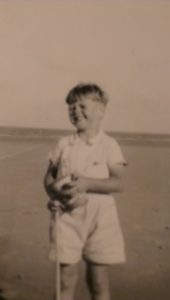
You can’t avoid assuming the slaughterhouse went some way to preparing him for the blood and gore he was to come across later. It was now that he had a second run-in with the police. ‘I was travelling home by bus, with my blood-stained butcher’s smock under my arm. Suddenly the bus stopped, a policeman gets on and takes me off, and I get another clip round the ear for wasting police time. I had to walk home. I don’t know what they thought I’d done.’
Bob could have become a cynical decrier of the law. Another time he was thrown into a van with an Alsatian snapping at him, for no good reason. But somewhere in Bob’s mind was the idea that policemen should be more like television’s Dixon of Dock Green. ‘I thought somewhere there must be a nice police officer.’
Bob qualified as a butcher, but by now he was married and the money was poor. So he left to work at the local dye works, an unforgiving place where he saw colleagues with terrible burns. ‘I’d blow my nose and give off blue dye, and thought this can’t be healthy.’ He stuck it for two years and then, taking a massive cut in pay, he joined the police force. The training was harsh. ‘In the first fortnight, I had my hair cut six times! We learnt to march, press our own uniform, bull our boots. You used to parade at 2 or 3 o’clock in the morning. I used to say to myself ‘what the hell am I doing here?’
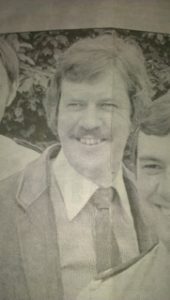
Two years and several exams later Bob was working five weeks of night duty, marching out on the streets of Huddersfield in his too-tight helmet and collar which rubbed. His dogged determination and fearlessness led to promotion, and Bob became a detective. He soon learnt that catching criminals had an element of luck – or otherwise. ‘Me and a colleague were watching a timber yard which had had been subject to arson attacks. We were there seven nights. On the eighth, a girl called Helen Rytka was murdered just yards from where we’d been sat: a victim of the Yorkshire Ripper.’ He pauses. ‘Just one more night and he’d have been well and truly caught.’
The Ripper case, then in its latter stages, was just one of very many high profile murders that Bob would see over the years, and it is a prime example of the way a case takes over the lives of those dealing with it. ‘There was so much criticism over the case – that Sutcliffe (eventually convicted) was questioned but let go several times – it destroyed the lives of those in charge.’
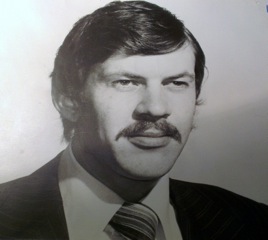
But being ‘the man in charge’ was something he aspired to. As a uniformed sergeant in Calderdale he was told: ‘We don’t go into that pub, they don’t like police!’ ‘Well, it was like a red rag to a bull! If you don’t nip behaviour in the bud it just goes on. So of course he went in, and glasses were thrown. It didn’t happen again. Not on his watch.’
Pleased to cast off the uniform yet again, he became a detective working on the infamous Sarah Harper murder, the little girl who went to buy a loaf of bread and never came back. Equally chilling were the Boarded Barn murders in Cheshire, where an ill-conceived attempt at kidnap and extortion led to the utterly callous murders of two young mothers. The team was commended for solving the crime, and Bob was promoted. As Detective Inspector he was given the Denis Hoban Trophy for outstanding detective work. Bob mentions this and his other commendations not with any arrogance but with an air of gratitude that his efforts have been noted. It is Carol who points out that most officers don’t get anything like the 20 certificates of commendation that Bob has accumulated over the years.
Bob became Detective Chief Inspector and held the post for seven years. He spent four years at Wakefield Detective School training future senior detectives; he became a hostage negotiator, and trained others in the art: ‘Fortunately, on incidents I went to I never lost anybody.’
His biggest fear was, being in the middle of six death-related cases at once, he’d blather out the name of the wrong victim to a relative. ‘One of them was the Huddersfield fire case (where petrol bombs were thrown through the window and petrol poured through the letter box killed seven in an Asian family). ‘Lovely family, but it was easy to pronounce the Asian names wrongly.’ In that case, the survivors wanted the victims flown home to Pakistan, and Bob, arranged all this. ‘I was the man in charge,’ he says, adding: ‘Don’t get me wrong, you’ve got forensic, you’ve got pathology – but it’s you that makes the decisions that will make or break the enquiry. So you go to the mortuary, you endure the very terrible sights and smells because you need to understand the nature of the injuries.’
Getting a feel for the atmosphere of a crime scene was important, too. One thing he found frustrating was that, as he rose to be DCI he was no longer allowed to interview suspects because the rank of Det Chief Inspector was deemed to be intimidating to suspects. ‘You learn so much from being face to face with people.’ For the Dylan series he resorted to reducing ‘his’ rank, because suspect interviews were an essential tool of the plot.
Bob believes two things are essential in policing. The first is common sense. ‘People say ‘you’re breaching criminals’ human rights.’ Hang on a minute! If you steal you’re a thief; you don’t swear because it’s rude. If you cross that line and injure or kill you should forfeit those human rights.’
The second is keeping a sense of humour. He talks about the man in charge of the mortuary who had a pacemaker, who was on the lookout for a free upgrade. Gallows humour maybe, but an essential pressure release.
Despite his relentless exposure to callousness he retained his belief in people. He recalls with pleasure people who went out of their way to thank him: the wife of one victim, ‘have-a-go hero’ Kevin Jackson, bought him a pair of slippers so he wouldn’t worry about bringing muddy shoes into people’s homes.
A sweet thought in a world of cynicism. Bob, when he became Detective Superintendent, had 26 murders in his last three years alone, as well as 50 suspicious deaths and 23 major incidents. In true Detective hero style, he had a maverick approach to the task. ‘We knew who killed Kevin Jackson because we’d got a DNA match from under his finger nails. So I got photos of the suspects and did the press conference in front of their photos which I’d had blown up into massive posters!’ Legally sensitive, perhaps, but Bob’s argument was ‘we’re looking for murderers here.’
As the face of the news conference, wasn’t he fearful of backlashes? ‘No, providing you’ve been right with them they’re right with you. I’ve always treated people the way I’d want to be treated. I go back to these influences from earlier,’ he says, referring to all those uncalled-for clips round the ear – ‘Police shouldn’t treat people like that.’ When in the midst of a case, members of the public would come up to him when he and Carol were doing the weekly shop with their own suggestions: ‘Here, Bob, had you thought it might be so-and-so that did it?’ Carol laughs: ‘We couldn’t get round a supermarket without someone coming up to us!’
Their lighthearted approach belies the reality that there were no real days off. His catalogue of cases is relentless. He spent days at a time in the mortuary – and TV post-mortems go nowhere to prepare for the real thing – and there were nights when Carol didn’t even know he’d come to bed at all. But he couldn’t rest until that case was finished because if you relaxed you might miss something. In the end his body told him to quit. He found, getting out of the car one night, he was frozen to the spot. His doctor suggested it was time to stop. ‘If you don’t step away you get sucked into a vacuum of sadness,’ says Bob.
Thirty years seemed a reasonable innings, and the Isle of Wight has had its fabled relaxing affect on this non-stop policeman and his wife. ‘Being in the Force meant I understood the demands of the job,’ says Carol. ‘And I love him, so of course I supported him.’ Some people say Jen, is too good but we tell it as it was – in a fictional tale.
Now, as well as the couple getting their DI Dylan books published by Caffeine Nights Publishers, Kent they also have a super literary agent in David H Headley (DHH Literary Agency, London). They are also active Patrons of three charities and Ambassadors for two others. Why? ‘I thought I worked hard,’ says Bob. ‘But the people who work for charities, they just give everything.’
The DI Jack Dylan series of books is available from all good book shops and on line.

Thanks! I love stuff like this! When someone knows exactly about what they are writing about because they lived it! ?
Great guest post!! 🙂
Great post! Fantastic couple, I have met them at an iow signing!
Snow Kills is my absolute favourite! It is super creepy! ??